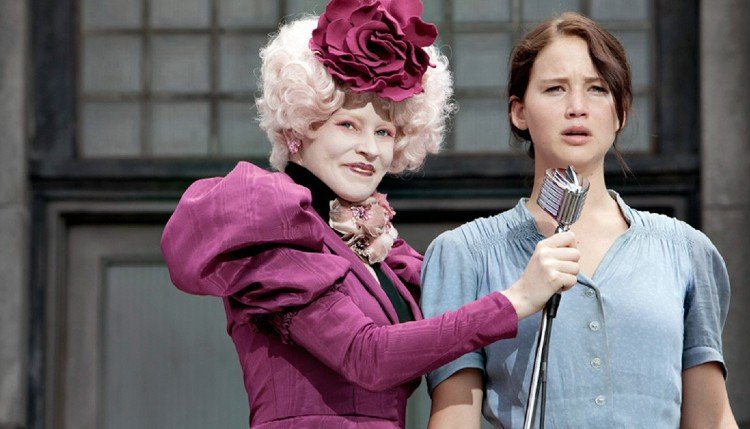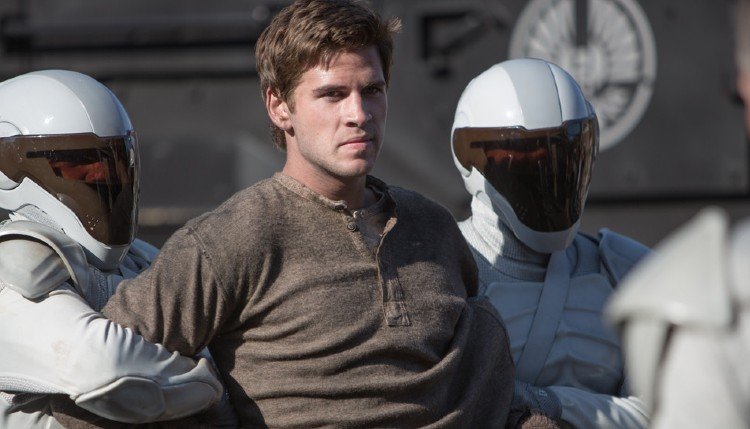Franchise Rewind: The Hunger Games (2012) The Hunger Games: Catching Fire (2013)
The Hunger Games, 2012 (Jennifer Lawrence) Lionsgate
The Hunger Games: Catching Fire, 2013 (Donald Sutherland) Lionsgate
“It’s a television show and being in love with that boy might just get you sponsors which could save your damn life.”
Dystopias come in all sizes and shapes. Some are the foundation of bad politics, climate crises, and technology gone haywire. Others, like The Hunger Games are derived from poverty and class warfare. Author Suzanne Collins makes her fictitious Panem analogous to the U.S.A., but she stays distinctly alien in name and territory choices, dividing “States” into districts; the first two being wealthy, the rest consumed in indigence.
The sparsely detailed backstory informs us after a failed rebellion nearly a century before, children ages 12-18 are chosen to fight to the death in the annual Hunger Games. Two “tributes,” one male and one female, are selected from each district, dropped into an outdoor arena, and basically try to kill one another until only one kid is left standing. The winner (and his or her family) are supposedly set up for life with food and shelter.
The contest is televised for a bloodthirsty viewing public, and the participants become celebrities. It’s like American Idol except with bows and arrows! In the latest lottery, Katniss Everdeen’s (Jennifer Lawrence) younger sister, Primrose, is selected for the pageant. Katniss offers herself as “tribute.” Right away, the Media (and the Government) are intrigued by this brave young woman, and she becomes popular with viewers.

As her fame grows, she inspires citizens to rebel, particularly after the death of a young girl named Rue (Amandla Stenberg), who has indirectly given her the nickname, “Mockingjay,” a bird that mimics any song that it hears. Rue’s death sparks dissension and discord across Panem, and evil authoritarian President Snow (Donald Sutherland) responds with violence. There’s a lot to recommend for The Hunger Games, but there are some inconsistencies.
When we’re first introduced to Katniss, she is tracking a deer in a lush, verdant forest setting. This doesn’t exactly look like an apocalyptic hellhole. In fact, it’s rather pretty to a city boy such as myself. There could be a deeper meaning to all of this. Is it perhaps the importance of television in these people’s lives that has somehow atrophied their survival mechanisms and made them lazy slaves to the empire?
Did people forget how to start fires to keep themselves warm? No, there are fires. Do people not know how to find food? Katniss is supposed to be 16 years old, but she’s a skilled hunter, so again: no. We have resources and food, so what went bizarrely wrong all those years ago? If anybody tells me I just need to read the book to understand the backstory or explain away the flaws, they would be missing the point. There has to be logic to anything, whether it’s a short story, comic strip, or movie.

If we’re dealing with food shortages and insane government overreach, I would expect to see barren wastelands; like a desert and ozone-crushing global warming, a planet in peril. A food shortage of such proportions that the human race is dying out. Everyone, including the poor, look healthy and well-fed. They look depressed, but fairly fresh. In their training before the game begins, Katniss and fellow “tribute,” Peeta (Josh Hutcherson) are mentored by previous District 12 winner, alcoholic Haymitch (Woody Harrelson), and vacuous chaperone Effie Trinket (Elizabeth Banks).
They are also informed that a burgeoning “romantic” storyline would make their characters even more popular. This is where I get lost in the author’s layers of social commentary. Is she satirizing television or government? Snow does anything he can to remain in favor. He even changes the rules so that there can be two winners instead of one. It’s not really a game if the rules can be changed. That’s like saying the football game ends when both quarterbacks are killed. It doesn’t work for anyone looking at a box score.
Nevertheless, Katniss and Peeta ultimately win by essentially threatening to eat the dreaded “Nightlock” berries and dying in some kind of a hari kari love pact in front of the television cameras. This irks Snow (knowing he has been out-manipulated), who declares them the winners, but the seeds of revolt have started to grow. The Hunger Games is a much more clever premise (and movie) than audiences give it credit for; even though it was a surprise hit earning close to $700 million on a $78 million budget.
“I did know Rue. She wasn’t just my ally, she was my friend. I see her in the flowers that grow in the meadow by my house. I hear her in the Mockingjay song. I see her in my sister Prim. She was too young, too gentle, and I couldn’t save her. I’m sorry.”
Author Suzanne Collins understands the importance of a franchise. Particularly a franchise born from her series of “young adult” books based on the adventures and exploits of one Katniss Everdeen (Jennifer Lawrence). Collins knows the first book pays the bills. The second book buys the car. The third book buys the house. The movie rights pay for her kids’ college and sets them up for life*. I’m sorry to sound so cynical about it, but this is the reason writers write. If they can carve out a niche, then they can become an industry.

Oddly, Collins doesn’t go where I think she’ll go with the second and third books. You would think each book dilutes the initial premise and gives us dry variations, but no. She looks closer. She goes into the workings of Panem, the government, Snow (Donald Sutherland), and the substantial resistance (to be revealed at movie’s end). If Snow sees Katniss as a threat, why doesn’t he send a SEAL team (or the Panem military equivalent) in and go surgical to end this nuisance?
He seems too thoughtful to be so sloppy and uninformed. This movie takes place shortly after Katniss and Peeta’s “victory.” I put victory in quotes because it was an obvious fix. Perhaps Snow’s arrogance prevents him from seeing Katniss as a threat, and more as a useful tool to be manipulated for the benefit of the viewing public/citizenry. Snow orders a 75th Hunger Games, which is kind-of an “All Star” affair featuring tributes from previous winning districts. The other districts are essentially manipulated into thinking this was because of Katniss’ defiance.
Snow assumes the other district tributes will work together to kill her and thus end their problems. Is Snow so used to a subservient public that he can’t understand the nature of rebellion? Does he not know that if he keeps squeezing his subordinates, they will snap? Apparently not, as the new “Gamemaker,” Plutarch Heavensbee (these names are so cute!), played by Philip Seymour Hoffman, is a turncoat for the rebellion. Dun-dun-DUH!

The games are effectively shut down when Beetee (Jeffrey Wright), the resident “tech” expert, determines the arena is based on the movements of a clock, and that various hurdles are programmed to occur every hour. He comes up with a plan to cause a power surge and destroy the dome covering the area and revealing the area to be nothing more than a hologram. This is a strange development. Why imprison tributes within a holographic arena? Why not simply have them fight each other and be vulnerable to real elements, not manufactured ones?
Unless the whole thing is just a sick, sadistic exercise (and flexing of the authoritarian muscle) like torturing ants under a magnifying glass. A ship drops down out of nowhere and rescues Katniss and the surviving contestants. Katniss is told District 12, her home, has been laid to waste, as retaliation. Of course none of this matters, and the message will not spread because the media is controlled by the government, even if the narrative changes, Katniss ceases to be the face of that government, and instead becomes a cultural pariah. That’s show-biz! Only in Panem, kids, only in Panem**.
*She also gets an “adaptation by” credit, which I can only assume means she provided a treatment of her novel for the screenwriters—cha-ching! She’s facilitating the screenwriting process by “helping out” the screenwriters. It used to be that a Paul Schrader would have to read The Last Temptation of Christ and then try to figure out a narrative thru-line to completing a first draft screenplay. Would Nikos Kazantzakis have provided an “adaptation” if he had still been alive?
**With praise for Liz Smith.

